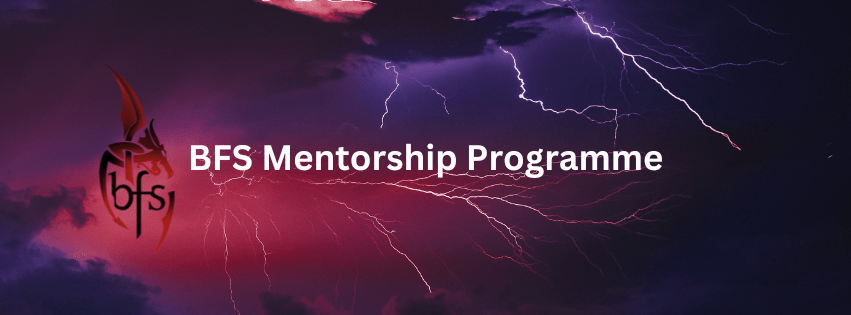Last month, the BFS announced a slew of new initiatives, each designed to help support the speculative fiction community and our membership to grow and nurture their talents and interests in this wonderful world of the unreal that we’ve created.Â
One of those initiatives was the BFS Mentorship Programme—and before we can properly launch that, we need some mentors! We’re recruiting mentors from around the publishing industry, which means we’re seeking not just writers, but also editors, publishers, agents, and anyone else involved in the world of publishing (not just tradpub, either; indie and self-pub are more than welcome!).Â
So to find out what mentoring is all about, we checked in with BFS member Dave Jeffery—who was named Mentor of the Year by the Horror Writers Association—to find out what this mentoring thing is and why you should put your hat in the ring. Over to you, Dave…

BFS: What attracted you to mentoring?
Dave Jeffery (pictured below): I’ve always held a view that knowledge and personal experience have greater meaning when used to help others. When I first started out writing genre fiction, availability and access to mentorship schemes was not readily available.

However, there were many experienced writers online (especially on Facebook) who were more than willing to guide neophytes, be that with critiques of pieces of work posted into comments boxes, or general information on the industry and how to navigate it. Seeing this wealth of support, and using it myself on several occasions, showed me first-hand the impact that mentorship, even in its most diluted state, can have on a writer. Given my penchant for wanting to help others, and as I gradually increased my knowledge of the craft, mentoring was a natural fit.Â
BFS: What does it mean in practice, to be a mentor for a writer?
DJ: It basically means dedicating considerable time for the betterment of the mentee and ultimately their craft. This can include full critiques of large volumes of work, working through each piece alongside the mentee in a spirit of collaboration; usually signposting to masters of the craft, and resources to further support and help the writer understand what makes a good story and to progress.Â
BFS: What skills do you think are useful for a mentor?
DJ: Here, it’s perhaps important to talk about writers and mentors simultaneously, as both will need to share the same attributes and values going into the mentor/mentee relationship.Â
Firstly, both will need to be fully committed to the process. By this I mean establishing early on what the expectations are of each other. What that looks like for the mentor is laying out what a mentee can expect from them, and the mechanisms by which this will be achieved. For the mentee, it means making clear what they wish to get out of the process, and to provide a current piece of work that they want to focus on for the mentorship period, be that a short story, a novella, or the first three chapters of a novel, with the aim of getting these pieces ready for submission to publishers, agents, or whatnot.
The second element is regular open and honest conversation and mutual respect. For me, this relationship means working collaboratively towards a common goal, never thinking or behaving in a superior or nihilistic manner. That requires the mentor to remain focused on the writer and their work, otherwise they risk doling out unhelpful altruistic comments. In turn, the mentee needs to explore all of the guidance on offer, and be prepared to challenge themselves and their current approach to the craft. It’s okay to question comments and critiques. Learning is a key aspect of the process, and to learn we must listen and act. Learning is not just the remit of the mentee, it is also that of the mentor.
Taking into account the above insights, a mentor needs to be open and honest, driven by a genuine desire to support the mentee in their progression, whilst remaining sensitive to how they impart information.
From a mentee’s perspective, it is about total commitment, and a desire to learn and hone their craft. This is the basis of a healthy relationship that fosters creativity.Â
BFS: What do YOU get out of it, as the mentor?
DJ: I love helping people. Doesn’t matter in what guise, doesn’t matter to what end. The mere act of working with fellow creatives towards a common goal is incredibly satisfying. I have been a mentor for the Horror Writers Association for four years now, and relish working with every single mentee. Not only is it rewarding, it’s a genuine privilege.Â
BFS: Why should someone put their hand up to be a mentor for this new BFS programme?Â
DJ: If you have the skills and, to be frank, the patience to work with creatives seeking support, then mentoring is a great way to consolidate and accentuate your own approach to writing. As a practice, mentoring is incredibly rewarding, and you can help in some small way to guide the genre writers of tomorrow create great genre stories!
Photo by Nathan Lemon on Unsplash

The BFS is currently building a pool of mentors, and hopes to open applications for mentees by the end of the summer. For mentors, it’s a paid role, and there’s a lot of flexibility in shaping how you organise your mentorship. Mentees will be required to pay towards the cost of the mentorship, with the cost heavily subsidised by the BFS.
Want to offer your services as a mentor? Apply by completing this form. If you have any questions about this programme or process, please use the #askthebfs channel in our member Discord, or email Chair@BritishFantasySociety.org or Secretary@BritishFantasySociety.orgÂ


